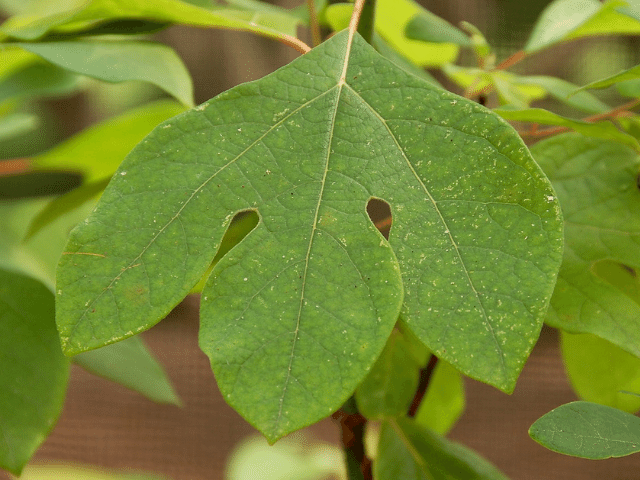Sassafras trees, grown into their own species, are native to parts of Eastern Asia and North America. These types of trees are deciduous and can grow up to 100 feet in height and possess a very unusual orange or yellow shade bark, which makes it easy to identify them.
The smooth bark and fragrant leaves of sassafras have been used as a traditional medicine for over centuries now, to treat ailments such as colds, skin diseases, diarrhea and furthermore.
This tree is an abundant resource of nutrients. One of the most common reason for using it in medicines is its pleasant taste. The tree and its parts are used in a wide range of food items from root beers to salads to root tea and majorly in Creole cuisine. It is also used in thickening food and brewing tea. The most common way of consuming sassafras is in the form of a tea which is prepared by boiling the root bark in water for 15-20 minutes, allowing the flavors to infuse in the liquid properly. Sassafras nutritional value makes it full of health benefits. Following are some:
9 Must Know Health Benefits of Sassafras
Inflammation:
One of the most powerful remedy against gout is the sassafras trees. This has been a trusted remedy for over thousand years now. Inflammation affects the body in several ways by providing a discomfort to the body, this plant helps in alleviating inflammation, gastric issues, symptoms of arthritis and headaches.
Dental Care:
For over centuries now, the twigs of sassafras have been used as an early form of toothbrush. The twigs contain a pleasant flavor such as of root beer and holds natural antiseptic properties. Using it as a dental disinfectant is a viable way for benefiting from sassafras.
Skin Care:
By applying a poultice of sassafras leaves on boils, sores, rashes, or marks on skin, can reduce inflammation quickly or discoloration of the skin. The presence of tannic acid and a unique compound known as sassafrid, helps in protecting the skin.
Immunity Booster:
Sassafras trees have antimicrobial properties which help in boosting immune system by protecting the body from foreign pathogens and free radicals, both internally and externally. It also acts as a remedy to keep the body away from stomach and respiratory infections.
Menstrual Pain:
Women suffering from menstruation, who experience painful symptoms such as bloating, heavy bleeding, cramps, intake of sassafras can significantly decrease the intensity of these symptoms. It is considered as a famous herb for women which is highly recommended.
Detoxification:
Sassafras, a well-known anti-diuretic, increases urination, which in turn helps in eliminating toxins, fats and salts from the body. To improve health and functioning of the kidneys, sassafras is a great component to flush out the whole system.
Relieves Pain:
Sassafras is well-known for its analgesic properties i.e., pain reliving properties. The leaves are wrapped around the wound for their anti-inflammatory property. In natural healing community, sassafras tea is still used widely and it’s topical application is suitable for pains and aches.
Heals Wounds:
Sassafras has the property to speed up the process of healing wounds. It is a natural stimulator which induces freshly oxygenated blood to the wound which speeds up the healing process. It is also said that it increases the metabolic rate of the body.
Anti-cancer Properties:
Safrole, a compound found in sassafras, has the potential to fight against hepatocellular carcinoma. Studies suggest safrole has antitumor and chemo preventive effects against certain types of cancer such as gastric cancer, tongue cancer, oral cancer, blood cancer, bone cancer, lung cancer, and prostate cancer.
The sassafras tea is a famous beverage which is known for its distinctive flavor and aroma, which reminds of root beer. It is said to carry numerous health benefits with a long history of medicinal use. According to Native Americans, sassafras is a miracle cure and the Europeans used it as a tonic. Some of the benefits are:
- Reduces symptoms of arthritis
- Treatment of sprains
- Improves urinary tract health
- Reduces fever
- Boosts immune health
- Improved digestion
- Improved blood circulation
- Reduces itching or swelling from stings or bug bites
- Clears skin and eyes
Despite of the abundant health benefits, sassafras tee has been a topic of controversy since very long. This is mainly because of the presence of safrole, a chemical compound which can be harmful for the human body. Multiple studies suggest that safrole might induce tumor growth and liver cancer. It has also been banned by the FDA for using it is a food additive. Hence it is recommended to choose safrole free sassafras tea to decrease the chances of risk factors.
Side Effects:
- Sassafras products are probably safe if they’re safrole free.
- It is said to be unsafe to consume safrole free sassafras in medicinal amounts.
- There is an increased risk of developing cancer.
- It is unsafe to consume it directly through mouth.
- The safrole compound present in the root bark and oil can cause liver damage.
- Consuming an amount of 5ml can cause death of an adult.
- If doesn’t suit, it can lead to hot flashes and excessive sweating.
- It can lead to hallucinations, high blood pressure, nausea, and vomiting.
- When applied on skin, can lead to rashes.
Precautions:
- Sassafras tea is not recommended for pregnant women as it stimulates menstrual flow.
- It is unsafe for breastfeeding women.
- Evidence exists that sassafras oil if taken during pregnancy might lead to miscarriage.
- Even a few drops of sassafras are deadly for children and hence it is unsafe for kids.
- If taken in medicinal amounts, it can slow down the central nervous system. Which means it can lead to excessive drowsiness and sleepiness.
- Sassafras should be stopped consuming before 2 weeks of a scheduled surgery.
- When it comes to urinary tract conditions, sassafras might make the condition worse.
References:
https://www.ncbi.nlm.nih.gov/pmc/articles/PMC2504026/













